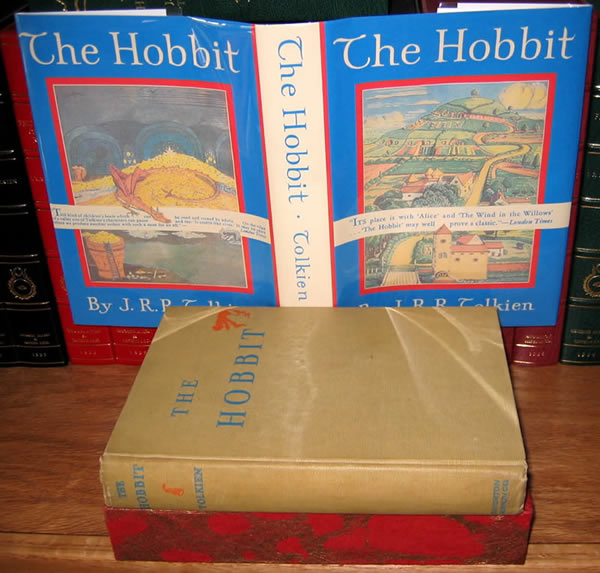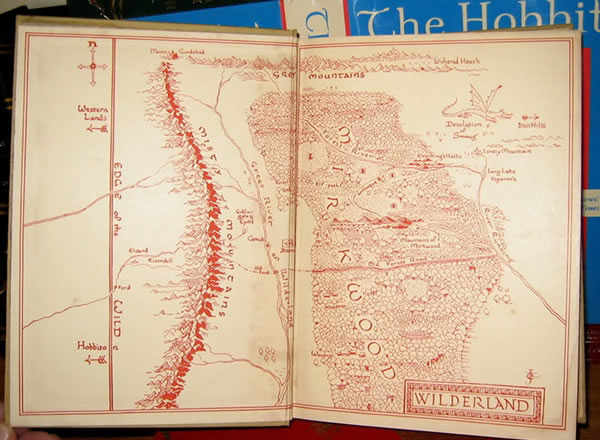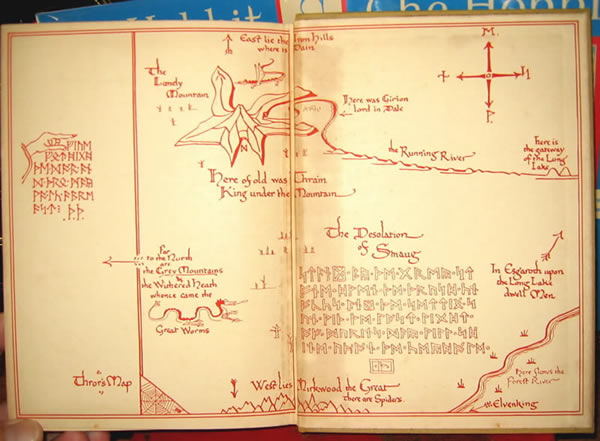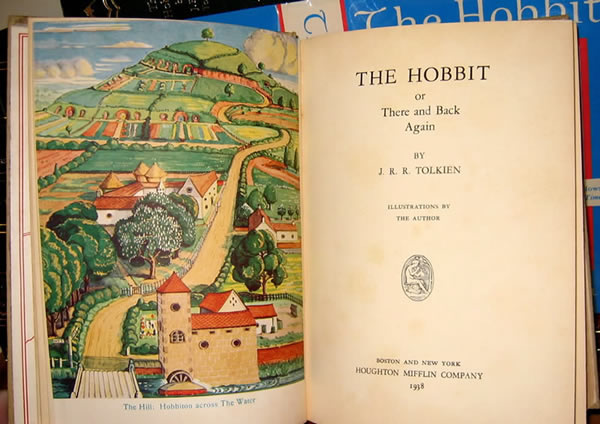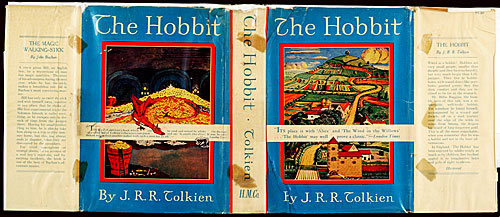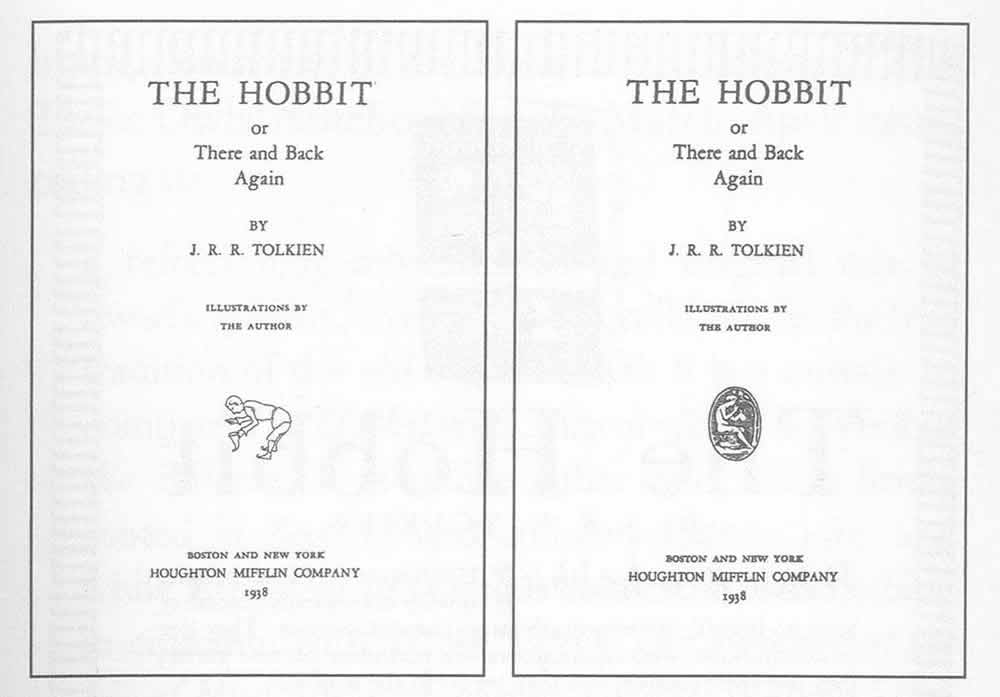The first US edition of The Hobbit (08.06.07 by Pieter Collier) - Comments
Exploring the First US Edition of The Hobbit by Houghton-Mifflin
It has been 70 years now since the Hobbit was published. For this reason I thought it nice to look back at some article I wrote some years ago. While the American Hobbit was only released 69 years ago, they still join in the celebration by releasing a 70th anniversary edition of the Hobbit. The UK equivalent of this book will also be available soon, namely inside The Hobbit 70th Anniversary Collectors Edition, of which you can find all info in this article.
The publication history of the first US Hobbit
The first American edition of The Hobbit (Hammond &
Anderson [A3b]) was published by Houghton-Mifflin in 1938,
one year after the British edition. It is significally different from
the UK edition, lacking the Britisch jacket Tolkien designed in favor
for a more 'american' jacket. Yet, the first US edition is one of the
most beautifully designed of the early editions of the Hobbit. Houghton
Mifflin chose to print it in a little larger size and on heavier
stock than Allen & Unwin's first edition, and they chose
for the inclusion of four of tolkien's color plates.
While the first British edition does have none at all.
The margins are ample and the typesetting iswell crafted for readability.
The tan cloth cover is printed in blue for lettering and red for the bowing
hobbit emblem on the front and the dwarf's hood emblem on the spine. One
minor point is that Houghton-Mifflin chose to print the end-paper
maps in red only, instead of the black and red chosen by Allen
& Unwin, wich is clearly more attractive and beautifull.
The American publishers also mistakenly put the Wilderland map
in front and the Lonely Mountain map in back, the reverse of
the description in the text. Chapter VII (Out of the Frying Pan) is incorrectly
identified as 'Chapter VI' in the first state.
The different states of the 1st US edition
There are four primary 'states' of the first American printing.
The earlier state, at least 3000 copies, shows on the title page the same bowing hobbit emblem visible on the cover. The second
state of the first impression, being 5000 copies, is characterized by
the replacement of the bowing hobbit with the Houghton-Mifflin device
of a seated flute player. The boots the hobbit wears
in the emblem were acknowledged to conflict with the text's description
of a bare-footed hobbit, so the publisher replaced the emblem with the
rather less appealing seated flautist. Another possibility for the change
is told, namingly the stamp for the bowing hobbit had broken and there
for switched. The first story seems more logic. Whether one calls this
development a variant state or a second printing is been a discussion
for a long time now. All of the first edition Hobbit printings
have the 1938 date on the title page, so researchers have been
hesitant to ascribe different printings to them. Others reason, however,
that Houghton Mifflin printed the volumes several distinct times between
1938 and the second edition of 1951. As evidence, each of the variations
described in the preceding paragraph could not have come about during
the course of a single printing run. Also, thirteen years elapsed between
the first printing and the appearance of the second edition; it seems
improbable that Houghton Mifflin would not have reprinted the book (presuming
the arrangements with Allen & Unwin permitted). And finally, while
the bowing hobbit (first printing) version appears on the market uncommonly,
first editions as a whole show up scarcely less often than all the printings
of the second edition.
In summary:
* First state:
Bowing hobbit emblem on title page.
Chapter
VII mistakenly titled Chapter VI.
Maps pasted down and are bound opposite to the order of the List of Illustrations, as per Hammond and Anderson.
Features the 4 color and 9 black and white illustrations by Tolkien.
* Second state: Seated flautist emblem on title page.
Chapter VII mistakenly titled Chapter VI.
Maps pasted down and are bound to the order of the List of Illustrations, as per Hammond and Anderson.
* Third state:
Seated flautist emblem on title page.
Chapter VII title corrected.
Maps pasted down and are bound to the order of the List of Illustrations, as per Hammond and Anderson.
* Fourth state:
Seated flautist emblem on title page.
Chapter VII title corrected.
Maps become free leaves.
All the states of the first edition measure 15.0 x 21.0 cm and contain 310 numbered pages.
The dustjacket
The dust jacket on the first edition is extremely rare. It is a medium blue field all around. The front announces the title in white, beneath which appears, in color and framed in red, tolkien's illustration of Hobbiton. The reverse displays tolkien's illustration of Smaug on his trove, also in color. If the jacket is intact it show the price of $2.50.
Prices
Prices of the American edition tend to lag those of the British because they are not considered 'original'. The first state catches exceedingly more money then the second, third and fourth state. The presence of the matching dust jacket often doubles or even triples the value of any of these states, particularly if it is in good shape and unrestored.
The first edition, with its very different account of Riddles in the Dark, is in great demand these days. Which is raising the price a lot. A third state first edition can be found for around $1750, when lacking the jacket. With the jacket it already costs around $5.750. The first state jacketless around that price and the first state with jacket can be found from $ 3.500; Yet be ready to pay more when you want a very nice and clean copy. A clean and perfect jacket is almost never to be found on the market. It is not known whether that is because of attrition or because some printings were not jacketed or because lots directed to some markets did not come with jackets.
Where to buy a first edition
The Tolkien Library Store always has some states of the first edition of the US Hobbit up for sale. You can find these in the 'original cloth' section (here).
References
- J.R.R. Tolkien: A Descriptive Bibliography by Wayne G. Hammond, with the assistance of Douglas A. Anderson.
- J.R.R. Tolkien: The Annotated Hobbit, annotated by Douglas A. Anderson.
- Identifying HMCo Editions of The Hobbit, From Wikipedia, the free encyclopedia.
Spread the news about this J.R.R. Tolkien article:
